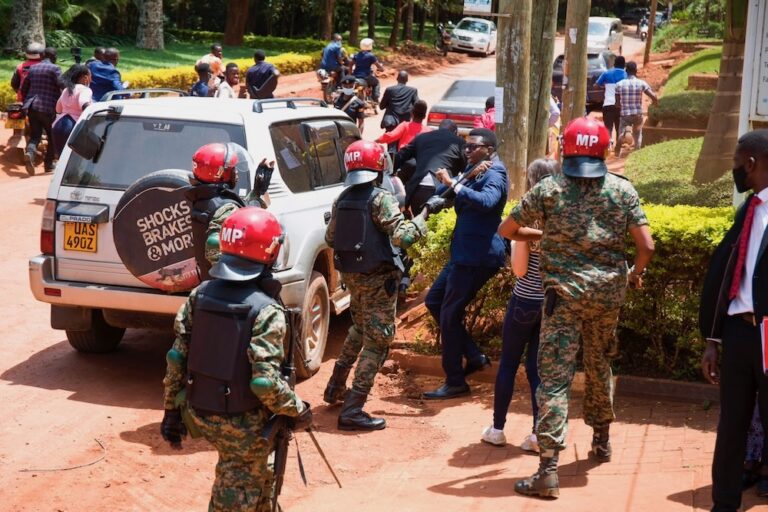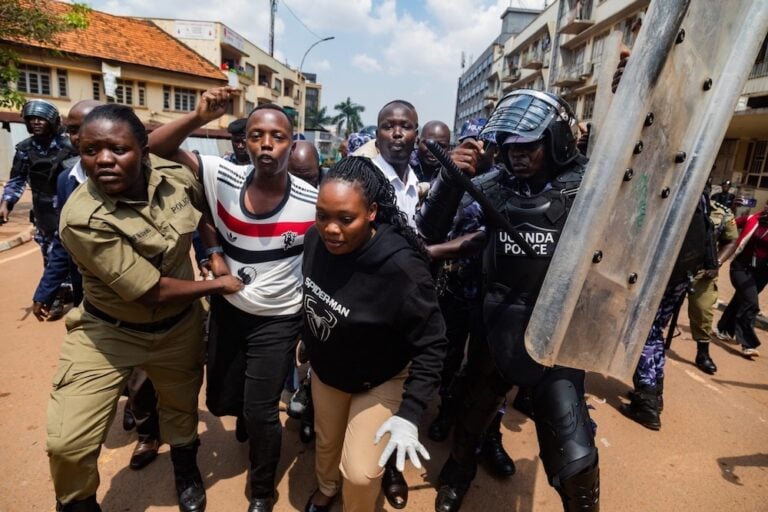With increased reports of killings, beating, assaults and threats to journalists, the space under which media exercise their fundamental rights and freedoms is increasingly being narrowed.
(HRNJ-Uganda/IFEX) – We, the undersigned freedom of expression organisations, are concerned about the declining environment for journalists in Uganda, and the growing overall threat to freedom of expression in the country.
With increased reports of killings, beating, assaults and threats to journalists at the hands of state authorities or the public, the space under which media exercise their fundamental rights and freedoms is increasingly being narrowed. This is a dangerous trend that must be stopped, especially during the lead up to the general elections in February 2011 when freedom of expression is particularly critical.
In the first six months of 2010, over 30 journalists reported harassment or suffered some kind of abuse at the hands of state organs or media-targeting mobs. Attacks that occurred in September of this year were particularly disturbing. Paul Kiggundu, a journalist working with Top Radio, was brutally attacked and killed by a mob in Rakai while reporting on a story. Three days later, journalist Dickson Ssentongo in Mukono was attacked and battered to death on his way to work from home. He worked with radio Prime, a Seventh Day Adventist church-based radio.
In the majority of cases, these crimes were committed with impunity. The culture of impunity is a growing problem in Uganda where personnel in state-run agencies, security apparatus and members of the public at large violate the media’s right to free expression without repercussion.
According to research conducted by the Human Rights Network for Journalists (HRNJ-Uganda) in the first half of 2010, the police were connected to 12 cases of abuse against journalists; individual members of the public were implicated in seven cases; three cases were reported against paramilitary groups; two against the Uganda Peoples’ Defense Force; two against the State and one against regulatory bodies.
Accompanying the physical abuse of journalists is the silencing of their voices through the actions of the regulatory Broadcasting Council (BC). In an attempt to halt political debate and commentary in September 2009, the chairman of the BC, Godfrey Mutabazi, arbitrarily closed five radio stations. Three stations have since been re-opened; however, none of them have been taken to court to justify their closure or re-opening. Of the 18 journalists suspended during this time on orders of the BC, only eight were secretly reinstated. Journalist Kalundi Sserumaga sought court intervention over his suspension, but his case has yet to be heard.
More recently, in April of this year, Mutabazi directed privately-owned radio Voice of Lango to suspend two presenters, Akena Patrick Ronex and Joe Orech, for hosting Uganda People’s Congress President Dr. Olara Otunnu.
Infringing on the freedom of the media to operate violates the very principle of freedom of expression as stated in the Constitution of the Republic of Uganda, the Universal Declaration of Human Rights and other international declarations, to which Uganda is a signatory.
During the lead up to the 2011 general elections, it is critical that the government of Uganda safeguard, protect, uphold and ensure that such fundamental rights and freedoms are fully respected, and that the media is protected. It is only with a free media that public affairs can be scrutinised, robust public debate can occur and corruption and other forms of malfeasance exposed. The government and public must be at the forefront of protecting and promoting the essential human right of freedom of expression by ensuring journalists are able to freely practice their profession without fear of being assaulted or silenced.
We therefore recommend that:
-police and other security agencies guarantee that journalists and media houses will operate freely leading up to, during and after the 2011 general election;
-the coordinator of security agencies and inspector general of police bring to justice all errant officers who have harassed and attacked journalists, and release reports of all cases that have been investigated by police;
-parliament release the police report coming out of the Commission of inquiry on police brutality which was headed by Hon. Peter Nyombi to facilitate the long-awaited amendment process of the Uganda police act and the penal code;
-parliament quickly pass the ‘Anti-torture bill’ which has been shelved for many years, as a way of ending impunity to individual perpetrators of violence against journalists and other citizens;
– the office of the Inspector General investigate the actions of the Broadcasting Council Chairman Godfrey Mutabazi in the interest of freedom of expression and media freedom;
-by recognising the important role of the media, the Ugandan public help protect journalists when they are under attack.
Signed,


